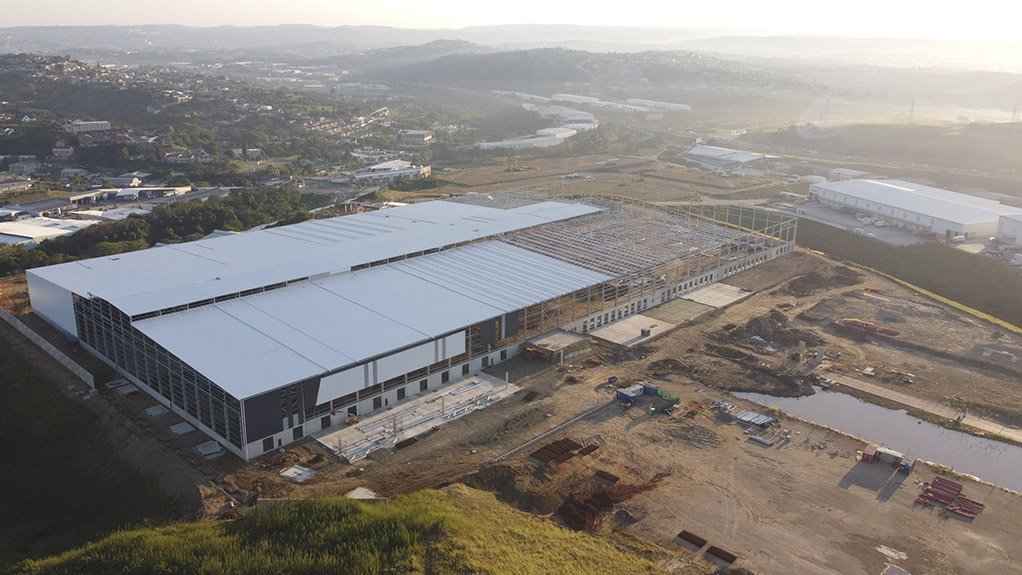Commercial property industry set to improve



MASSMART PROGRESS Covid-19 has enhanced is the use of space
SIMON BLACK Greater stability is anticipate across prime office markets
The commercial property sector is set to improve once Covid-19 restrictions are eased and the South African economy has navigated its way through the harshest of the pandemic’s impact, says commercial real estate agency Black Pepper Properties director Simon Black.
The office market has been heavily impacted on, compared to other property sectors; however, the full impact can be understood only once there has been a round of lease renewals over the next 12 to 18 months.
The Sandton central business district, in particular, is concerning, owing to the number of vacancies having reached record levels, which is compounded by a large number of occupiers looking to give up space, says Black.
Although the hospitality industry has also been severely impacted by the pandemic, it is difficult to assess the current impact on commercial real estate because of limited data, which, in turn, is limited, owing to a relatively low number of transactions.
However, it is expected that the commercial property sector, including the office market and hospitality industry, will improve.
“Once our infection levels subside and the easing of restrictions begins, we anticipate greater stability across prime office markets,” explains Black.
The prime office markets, in Gauteng, KwaZulu-Natal and the Western Cape, have suffered from a sharp supply-demand imbalance, widening vacancy rates and decreasing rents over the past year.
“With the first half of 2021 behind us, we are now able to review our successes and failures to stay the recovery road following massive global adversity,” he adds.
While the pandemic has not ended, businesses are putting plans in place to ready themselves for the expected surge in activity once the easing of lockdowns starts.
“I think what Covid-19 has enhanced is the use of space and opened possibilities that were previously unattainable,” Black says.
The recent violent devastation of property in Gauteng and KwaZulu-Natal is yet fully quantifiable. However, there may be a flurry of market activity as distribution and retail operators look to reopen supply chains and get back to business as usual, Black adds.
Trends in Real Estate Sector
Office environments that provide flexibility are likely to benefit, as well as those in preferred locations, as a more distributed workforce will need convenient, centralised meeting points.
While trends, such co-working and e-commerce, have been available for years, it has become evident that increased flexibility is possible across all real estate sectors, he adds.
The pandemic has forced business to learn and adapt, “for example, increased demand for last-mile logistic facilities is foreseen as online retail continues to develop, with underperforming office and retail assets being converted to cater for these inner-city hubs”, Black explains.
Some malls, which have been negatively impacted on by the pandemic, could be turned into mini-hubs for logistics operators.
Black explains there are many logistics real estate opportunities in Gauteng, KwaZulu-Natal and the Western Cape. There have also been recent approvals and upgrades to various ports systems, which bode well for improved capacity and efficiencies across South Africa.
The need for warehouse space and facilities that process goods for e-commerce is also expected to increase. Companies have to build regional supply chains, owing to the rise in e-commerce.
Self-storage is also in demand, especially when offering secure, temperature-controlled amenities.
There is also a large increase in demand for data centres, as a result of an increasing number of people working remotely and businesses migrating to cloud-based solutions.
Demand for data centres and towers – the infrastructure that stores and carries data – has increased significantly, owing to reliance on telecommunications and work-from-home initiatives, he says.
“Companies, such as multinational professional services network Deloitte, have made remote working a permanent feature for at least some of their workers. Consumer behaviour has been changed, possibly irrevocably, with neighbourhood centres and leafy suburban office parks likely to make a strong run,” says Black.
Additionally, the changing requirements for office space, including ageing buildings and outdated floorplate designs, may result in the increased implementation of green building initiatives. This change may affect future rentals and office sector returns.
“It is anticipated that best-in-class office buildings will be more focused on physical and mental wellbeing by offering direct access to green spaces, such as the provision of gardens, sanctuary spaces, such as wellness rooms where occupiers can disconnect, focus or reconnect with themselves,” explains Black.
These new office concepts can, in turn, lead to the development of mixed-use urban locations.
Digitalisation
A change in all real estate markets is the digitalisation of information. It is being adopted because outdated information technology, along with limited transaction volumes, has hindered property valuations during the first wave of infections.
“In the long term, increased use of digital channels across all real estate sectors will increase market transparency, as well as market efficiency,” says Black.
While uncertainty currently reigns, market leaders may discover the next frontier of profitable real estate trends by employing a range of creative ideas.
Article Enquiry
Email Article
Save Article
Feedback
To advertise email advertising@creamermedia.co.za or click here
Press Office
Announcements
What's On
Subscribe to improve your user experience...
Option 1 (equivalent of R125 a month):
Receive a weekly copy of Creamer Media's Engineering News & Mining Weekly magazine
(print copy for those in South Africa and e-magazine for those outside of South Africa)
Receive daily email newsletters
Access to full search results
Access archive of magazine back copies
Access to Projects in Progress
Access to ONE Research Report of your choice in PDF format
Option 2 (equivalent of R375 a month):
All benefits from Option 1
PLUS
Access to Creamer Media's Research Channel Africa for ALL Research Reports, in PDF format, on various industrial and mining sectors
including Electricity; Water; Energy Transition; Hydrogen; Roads, Rail and Ports; Coal; Gold; Platinum; Battery Metals; etc.
Already a subscriber?
Forgotten your password?
Receive weekly copy of Creamer Media's Engineering News & Mining Weekly magazine (print copy for those in South Africa and e-magazine for those outside of South Africa)
➕
Recieve daily email newsletters
➕
Access to full search results
➕
Access archive of magazine back copies
➕
Access to Projects in Progress
➕
Access to ONE Research Report of your choice in PDF format
RESEARCH CHANNEL AFRICA
R4500 (equivalent of R375 a month)
SUBSCRIBEAll benefits from Option 1
➕
Access to Creamer Media's Research Channel Africa for ALL Research Reports on various industrial and mining sectors, in PDF format, including on:
Electricity
➕
Water
➕
Energy Transition
➕
Hydrogen
➕
Roads, Rail and Ports
➕
Coal
➕
Gold
➕
Platinum
➕
Battery Metals
➕
etc.
Receive all benefits from Option 1 or Option 2 delivered to numerous people at your company
➕
Multiple User names and Passwords for simultaneous log-ins
➕
Intranet integration access to all in your organisation




















